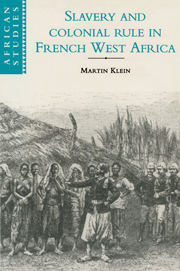Book contents
- Frontmatter
- Contents
- List of illustrations
- List of maps
- List of tables
- Preface
- List of abbreviations
- Glossary
- 1 Slavery in the Western Sudan
- 2 Abolition and retreat. Senegal 1848–1876
- 3 Slavery, slave-trading and social revolution
- 4 Senegal after Brière
- 5 Conquest of the Sudan: Desbordes to Archinard
- 6 Senegal in the 1890s
- 7 The end of the conquest
- 8 The imposition of metropolitan priorities on slavery
- 9 With smoke and mirrors: slavery and the conquest of Guinea
- 10 The Banamba Exodus
- 11 French fears and the limits to an emancipation policy
- 12 Looking for the tracks. How they did it
- 13 After the War: renegotiating social relations
- 14 A question of honor
- Appendixes
- Notes
- Bibliography
- Index
- Titles in the series
11 - French fears and the limits to an emancipation policy
Published online by Cambridge University Press: 07 May 2010
- Frontmatter
- Contents
- List of illustrations
- List of maps
- List of tables
- Preface
- List of abbreviations
- Glossary
- 1 Slavery in the Western Sudan
- 2 Abolition and retreat. Senegal 1848–1876
- 3 Slavery, slave-trading and social revolution
- 4 Senegal after Brière
- 5 Conquest of the Sudan: Desbordes to Archinard
- 6 Senegal in the 1890s
- 7 The end of the conquest
- 8 The imposition of metropolitan priorities on slavery
- 9 With smoke and mirrors: slavery and the conquest of Guinea
- 10 The Banamba Exodus
- 11 French fears and the limits to an emancipation policy
- 12 Looking for the tracks. How they did it
- 13 After the War: renegotiating social relations
- 14 A question of honor
- Appendixes
- Notes
- Bibliography
- Index
- Titles in the series
Summary
When the white man entered this land, they called a meeting of the Fulbe and the slaves and said that from that day slavery was over. They asked the Fulbe if they were satisfied with this. The Fulbe answered yes without any opposition to the colonial rulers who had the power. A scholar in the crowd walked to the middle of the circle and said: “You, Fulbe gathered here, listen to me. Keep this in mind. From today, you are like orphans. You have no slaves any more. Your only slaves are your cows. Take care of them like members of your family.” Those who had land were saved from the humiliation of [farming] and working the land. The ones who did not own cattle became farmers. This is how some families became farmers.
Amadu, a shepherd from Konna (Masina)The commitment of Ponty and other senior administrators to personal freedom had its limits and these became evident in the first years of the new regime. The return to earlier homes was very orderly, as Ponty repeatedly assured all who would listen, and the effect of emancipation was to free the energies of slaves for other kinds of productive activity. In spite of this, most administrators were cautious about freedom and believed in the necessity of both coercion and hierarchy. We see this in the way they responded to a crisis in fertile Masina and in hesitant efforts to force Guinea to catch up with Senegal and Sudan.
- Type
- Chapter
- Information
- Slavery and Colonial Rule in French West Africa , pp. 178 - 196Publisher: Cambridge University PressPrint publication year: 1998

